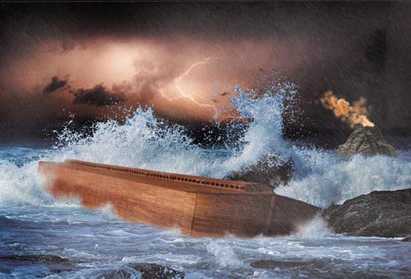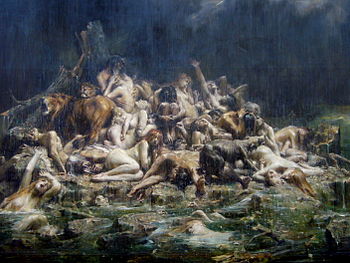 In seeking to understand what is going on in the account of the flood and why the waters that came upon the earth, we must understand the Ancient Near East cosmology. That is, what they thought about how the world worked, and what connections existed between the spiritual realm and the physical realm.
In seeking to understand what is going on in the account of the flood and why the waters that came upon the earth, we must understand the Ancient Near East cosmology. That is, what they thought about how the world worked, and what connections existed between the spiritual realm and the physical realm.
The Waters in the Ancient Near East Cosmology
In reference to the flood, one of the most important points to grasp is that in ancient Middle Eastern cosmology, the waters of the world—especially large bodies of water such as the ocean and the sea—were considered to be the dwelling places of powerful deities.
Though he goes by different names in different cultures one of the more prominent pagan deities was Yamm, the god of the sea. As such, when we read in numerous places in the Bible about the raging waters, and God’s control of them, it is not that God is fighting the waves of the ocean, but that God is viewed to be at war with Yamm, the god of storms and chaos (cf. Ps 69:1-2; 74:13; 77:16).
In his book, God at War, Greg Boyd shows the depth and breadth of this imagery throughout the Hebrew Scriptures. In reference to Genesis 1, he says that all ancient Near Eastern people would have understood the imagery of the “the deep” and “the waters” which covered the earth.
Such imagery was prevalent in ancient creation myths, and typically, when the gods of these myths set out to bring order to the chaotic waters, they did so through war, battle, and violence (Greg Boyd, God at War, 159-164). The Hebrew God of Genesis 1, however, needs no violence. He brings order to the chaos with nothing more than His voice (Greg Boyd, God at War, 86). He simply commands the anticreation chaotic waters to retreat, and they do! Yamm is shut up behind closed doors by the command of God.
At the end of the creation account, God gives dominion over the earth to mankind—the pinnacle of His creation. The dominion over the earth is understood as the rulership, control, or authority over the earth. But when Adam and Eve sinned, when they fell to the temptation of the serpent, they forfeited their dominion over the earth, and gave that authority to a different “god of this world.”
Greg Boyd describes it this way:
We compromised our assigned task to have dominion over the world and thus subjected ourselves and all of nature once again to the destructive influence of the forces that oppose God. The guardians of the world, and therefore the world itself, were thus taken hostage by an illegitimate hostile power. Satan now seizes “control of the entire world” and becomes “the prince of this age” and “the ruler of the kingdom of this air” (1 John 5:19; John 12:31; Eph 2:2; cf. 6:12)…
This reacquired demonic lordship… led to a partial return to the judged state of affairs in Genesis 1:2, when the Lord allowed the chaotic waters to burst upon the earth with the flood (Genesis 6-8). The intended viceroys of the earth had become so corrupt that they apparently cohabited with sinister angelic beings (Genesis 6:1-4), and the Lord was grieved to the point of wishing he had never created humanity (Genesis 6:5-6). Hence he allowed the “deep” (Genesis 1:2) once again to cover the earth, as he sought to start over the project of recovering the earth for his glory (Greg Boyd, God at War, 111).

The Waters in Creation
Once we see the mythological imagery of spiritual warfare in the heavens between God and the waters, and we understand from Genesis 1 that from the darkness and chaos of the water, God is seeking to bring beauty and order, we are then in a position to understand Genesis 6–8. Genesis 6 is seen as a natural consequence of the forces of chaos that live in rebellion against God having control over the earth. Though God locked them away with His word in Genesis 1, they once again gained control of the earth through the actions of Adam, and as a result, death reigned from one generation to the next (see the emphasis on death in Genesis 5).
Eventually, the Satanic powers brought so much evil into the world, that they were once again able to lead the world to the brink of complete destruction. This is what Genesis 6 describes. If the spiritual forces that are at war with God were driven back in the creation event, then God Himself is driven back by these chaotic forces when they conscript mankind to fight for their evil cause against God. Humanity becomes such a good ally in the war against God, that “every intent of the thoughts of his heart was only evil continually” (Gen 6:5). Evil had become so great upon the face of the earth, that a return to the pre-creation chaos was inevitable.
 This reversal of creation occurs in Genesis 7 when the flood waters come upon the earth. As a result of this onslaught against God, the forces of chaos are able to get God’s creation to revert to their state of being formless and void.
This reversal of creation occurs in Genesis 7 when the flood waters come upon the earth. As a result of this onslaught against God, the forces of chaos are able to get God’s creation to revert to their state of being formless and void.
In the flood, just as in Genesis 1:2, the waters covered the face of the earth. This warfare imagery is clearly evident in Genesis 7 where it says over and over that “the waters prevailed” (Genesis 7:18, 19, 20, 24). Just as God had breathed into living beings the breath of life (Gen 2:7), so the waters which fought against God’s creation were able to take the breath of life away from all that God had made (Genesis 7:15, 22).
Then, finally, in Genesis 8:1, 9, God begins to fight back against the waters by sending wind to blow over the surface of the deep, just as He did in the creation (Genesis 1:2). As a result of the wind blowing over the water, the waters recede and are restrained (Genesis 8:2-3, 5)—again, just as they were pushed back in creation. Eventually, dry land appears (Genesis 8:13) and the animals and humans can be fruitful and multiply upon the face of the earth as God originally ordained (Genesis 1:22, 25; 8:17).
The Waters in Genesis 6-8
So what do we see in Genesis 6-8? While some people see only a mythic fable in the flood account, in which imagery of water and wind illustrate the constant struggle between good and evil, I believe that the imagery does actually represent a historic reality. While it is true that the powers of darkness are waging war against God and His good creation, this war is not only a spiritual battle, but is a battle that has wide-reaching ramifications in the physical realm, and influences all life on earth.
Although we must not ignore the imagery of the wind and the water in this text, nor must we think that the flood account is nothing more than a ancient myth designed to illustrate a spiritual truth. The historical reality of the flood and the spiritual truth that it reveals are both present in this text, and both shed light on what occurred in the flood event.
When we consider the historical reality and the spiritual imagery together, what we see in Genesis 6-8 is the near victory of the forces of evil against the power of God so that the waters threaten to kill everything that has the breath of life. In the cosmic war between God and His rebelling creation, the first battle was won by God in Genesis 1 when He pushed the chaos back by His mere word. He brought light, beauty, and order to that which was formless and void. But evil rallied their forced and gained a great ally when they deceived Adam and Eve to hand over the Satan the dominion of the earth. The powers arrayed against God were able to get the pinnacle of God’s new creation to betray God and fight for them in their evil cause. The evil they accomplished soon became so great, it threatened the very existence of God’s good creation.
When God saw what was about to happen to His world, He stepped in to rescue and deliver as many as He could from the approaching storm. But in the end, only eight were saved, and the flood waters that came upon the earth returned everything to the way they were before Genesis 1:2. Though God had rescued a remnant, it appeared that God had lost this battle. Nevertheless, He immediately set out to rebuild and restore His creation. He once again sent the wind to push back the waters into their designated places, to dry out the land so that humans and animals might once again have a way to fulfill their God-given task of filling and subduing the earth.
The waters of the flood cause the world to revert the the chaos of a pre-creation state. The flood reveals cosmic warfare between God and Yamm, the god of chaos and storms.
Have you familiar with this imagery behind the waters of the flood in Genesis 6-8? What are your thoughts about how this sheds light on what is going on in the flood?
 How can a God who says "Love your enemies" (Matthew 5:44) be the same God who instructs His people in the Old Testament to kill their enemies?
How can a God who says "Love your enemies" (Matthew 5:44) be the same God who instructs His people in the Old Testament to kill their enemies?
These are the sorts of questions we discuss and (try to) answer in my online discipleship group. Members of the group can also take ALL of my online courses (Valued at over $1000) at no charge. Learn more here: Join the RedeemingGod.com Discipleship Group I can't wait to hear what you have to say, and how we can help you better understand God and learn to live like Him in this world!




I don’t know if I’d say God lost that battle… not sure what I’d call it.. maybe suffer, like He did at the cross… but.. we know how that turned out…
Yes, that term might be too strong. God of course won the war…. so I wasn’t trying to imply anything like defeat.
I like where you and Greg Boyd are going with this, I’m just interested how you reconcile this view with Genesis 6:13 where it says God is going to destroy the people and the earth.
Yeah, I will get to this verse, but am not super satisfied with my answer. Did Greg Boyd teach on Genesis 6:13 somewhere? I would love to read it…
That’s VERY cool, Jeremy! Love it! Love where your journey is taking you with God; keep on keepin on!
I believe a similar version of what you are suggesting in this article. It also throws the whole theory of “God is in control of everything” right out the window.
I have just started reading your blog but I have been greatly influenced by N.T. Wright and he has recreated the framework of how I read the Bible. I have been especially interested in the Creation and Fall stories in Genesis as well as the Flood Narrative. I think that you have added a piece of the puzzle to my understanding of these narratives in this short little blog and I thank you for that. I always thought that Adam and Eve’s expulsion from the Garden was somehow an act of Grace from God because he didn’t want humans to eat from the tree of life in a state of falleness so that they wouldn’t be able to live eternally in a state that was fallen or with sin. God is working out the re-entrance of humans through the gate that leads to the tree of life but that work of recreating creation is not finished yet so God can’t yet open the door to the tree of life. I had thought that the human state of falleness was a state that somehow through discipleship with Jesus would somehow in the long run work its way out and then the gate to the tree would be open. But that seems to rely too much on human ability to overcome Evil and with our track record that doesn’t seem like a good possibility. But when I think about Evil in terms that you frame it then I see that perhaps the Church’s job is to fight a battle that is being commanded by King Jesus. So discipleship is learning the virtues of Jesus so that when the time comes that we are called to act then we can act out of our second nature to do what King Jesus tells us to do. So is the Church like King Jesus’ foot soldiers in a way? If there would have been King Jesus foot soldiers at the time of the flood would the battle have been fought in a different way? Perhaps that isn’t a good question but what I am wondering is is the Church’s vocation to be a sort of Army that is disciplined in the ways of King Jesus? NT Wright says that humans are meant to be Rulers and Priests. We were originally meant to be the stewards of Creation in order to make it flourish. If I understand Wright correctly at some point when the New Heavens and New Earth are created we will be called upon to practice that vocation as it had been originally intended for humans but until that time we are called to do that as if King Jesus’ throne is on Earth as it is in Heaven. I am wondering if the Church’s role in the mean time in addition to this is also to somehow be foot soldiers? When I say that I am not sure that really makes sense because what are our jobs for now but I still wonder about it. I was wondering if you might share some thoughts? I guess you may have written about this in your blog but I just haven’t read it yet. Thanks for you time!
I too, have been influenced by NT Wright.
If I understand your question correctly, I would say “Yes.” We are to be living now as if heaven and earth were one. We are to be living now in light of that future reality. In this way, we show people a better way, we tell a better story, and we invite people to join us in a better reality. There are a wide variety of ways we can do this, but one of them is through our day-to-day jobs, whatever they are, working with honesty, integrity, and generosity, all of which is quite rare these days.
Thanks for your reply. As the dispatcher for a local trucking company and now as the owner of a single truck trucking company I can really appreciate your comment. I found that being a dispatcher was a good way of practicing from day to day honesty, integrity, and generosity. Over the past number of years I have been practicing not lying in any situation. I must say that it is quite difficult. In my relationship with the truck drivers that I dispatched I found that never lying to them was quite difficult but also quite rewarding. I also thought that sugar coating things was lying so I didn’t do it. That often made conversations more difficult because I couldn’t hide behind the wall that lying provides. I also found that in the long run that made most drivers trust and respect me more. The same went with dealing with customers. I practiced never lying to them which meant that I sometimes had to tell my customers things that they wouldn’t want to hear and I had to take responsibility for the mishaps but it also in the long run made them trust and respect me more which I think led them to entrusting me with their freight. As a small business owner I think it also spills over in the same way. The people who employ me trust me and respect me and therefore keep me busy.
I say all of that not to boast in anyway but to say I agree with you and that I do think honesty, integrity, and generosity is quite rare these days, especially in the trucking industry which often times is very competitive and cut-throat. I have been intentional in trying (using the word trying grants that I screw it up sometimes) to be one of the “rare one’s” in the industry.
I think I still have a question though that I didn’t quite articulate well enough in my original comment. In what ways is God in direct confrontation with Evil in the world today like God was in direct conflict with the water in the Flood narrative? Is it simply that God is in direct confrontation with Evil in his people when they live lives of honesty, integrity, and generosity? Is it as simple as that? Is that the only way that God is in confrontation with Evil? Is there also the possibility that God is fighting Evil in a realm that we can’t see with our eyes? Is Evil alive on Earth in forms that aren’t exactly human? Perhaps I am allowing my mind get away from me and that I have watched the Lord of the Rings, Star Wars, or Dune, or other sci-fi movies too many times but I wonder if there is real battle going on for “Middle Earth”. Does the Evil that corrupted Adam and Eve in the Garden have a corporal form in the world today that isn’t exactly human? Or is it that Evil is more like Anakin Skywalker being taken over by the “Dark Side” where the Evil that is in Anakin is manifested through the human Anakin and he becomes the evil Darth Vadar. I guess to state my question more bluntly I am wondering who the “sons of God” are in Genesis 6? Asking the question like this makes me laugh a bit because it is so strange that it is almost embarrassing to ask publicly but I must honestly say that the question is intriguing to me. Does any of that make sense?
Thanks!